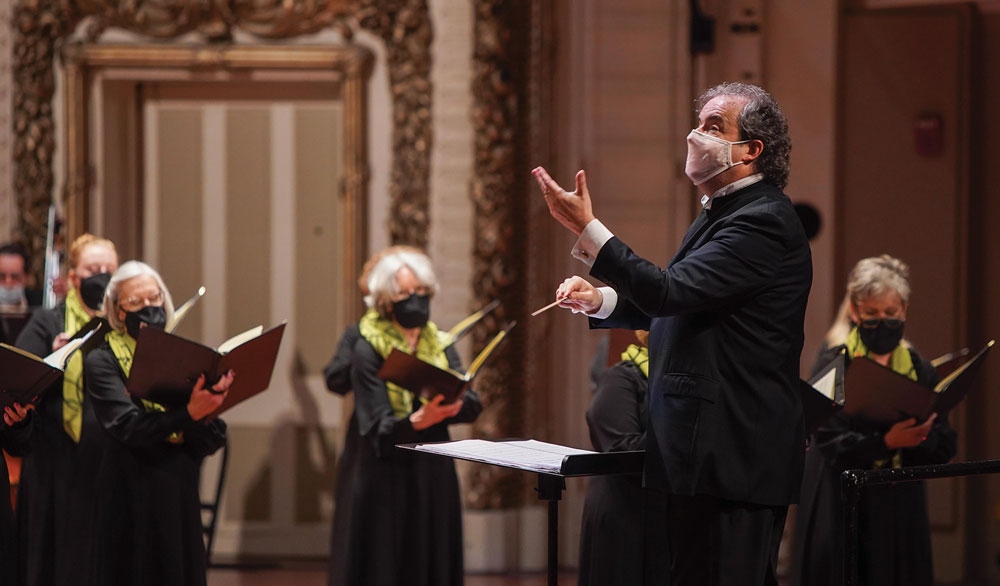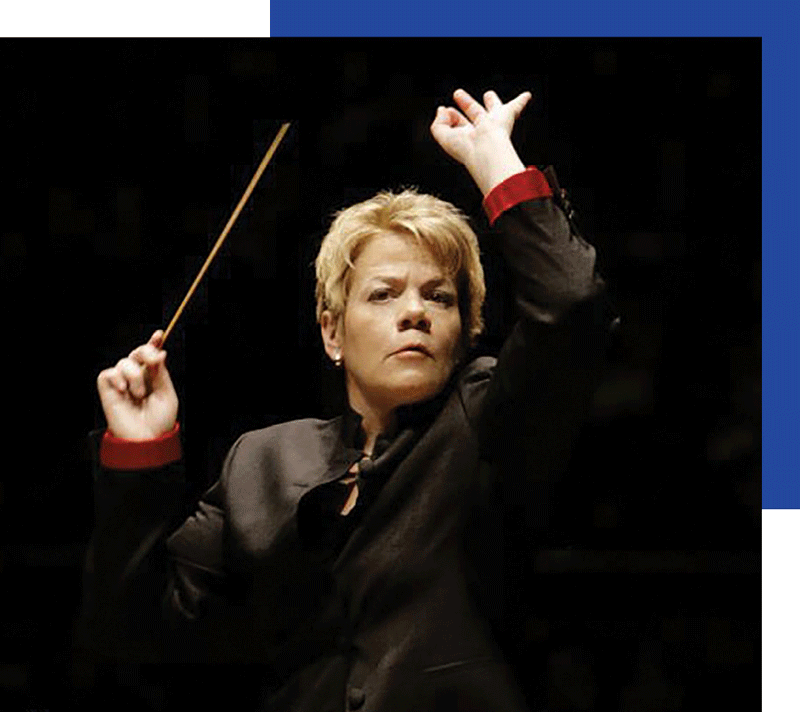
by Ken Smith
You have to admit, they had a great excuse. When J.S. Bach’s Magnificat received its U.S. premiere at the May Festival in 1875, the organizers couldn’t exactly invite the composer on stage to take a bow.
In Cincinnati, the past remains the present, the present becomes the past, and both are poised to shape our future.
Unlike Bach, though, who died 125 years too soon to greet Cincinnati audiences, Gustav Mahler actually had his music performed at Music Hall in 1905—while he was still alive. The year before, Richard Strauss conducted the Cincinnati Symphony Orchestra (CSO) in several of his own works; the year after, Camille Saint-Saëns performed his Piano Concerto No. 5 with the same orchestra on the same stage. We could go on, and on.

Although each of the conductors appearing this season—from “newcomer” Marin Alsop (making her May Festival debut on May 20) to 37-year Festival veteran James Conlon (returning on May 25) to—differs in their wording, they’ve said essentially the same thing: In Cincinnati, the past remains the present, the present becomes the past, and both are poised to shape our future.
That motto could easily apply to classical music in general, but it rings especially true as the May Festival celebrates its 150th anniversary and also marks the final season for its Principal Conductor Juanjo Mena. “I have found Cincinnati to be amazing in its openness and creativity,” says Mena, who has helmed the Festival since 2018. “There have always been premieres here—and not only of new works. Even during the horrible pandemic time, we managed to discover Gustav Holst’s Hymns from the Rig Veda, which is not the Holst people thought they knew. From my first day here, we wanted the people of Cincinnati to sing with us, to discover new things, to realize that it’s their Festival.” (Read “Celebrating Juanjo Mena” for more on his final Festival.)
Bach still won’t be taking a bow after the Magnificat on Mena’s opening program on May 19, though two other composers will. The evening also features world premieres of works commissioned from figures already familiar to CSO audiences: James MacMillan, who served as a May Festival Creative Partner in 2019, and James Lee III, whose Sukkot Through Orion’s Nebula Mena first conducted with the CSO in 2012 (see sidebar).
Another case study of a world premiere becoming recurring May Festival repertory turns up on Alsop’s program, with The Ordering of Moses by the Canadian-born, Oberlin Conservatory-trained composer Robert Nathanial Dett. Originally performed at Music Hall in 1937 for a national radio broadcast on NBC, it was interrupted on air midway due to “technical difficulties” long suspected, but never proved, to be resulting from complaints concerning a piece written by a Black composer.

Alsop, for her part, is looking forward to making her May Festival debut on such a large scale. “I probably suffer from ‘bigger is better’ syndrome, so adding a choir and text is perfect for me,” says Alsop, who will lead the work alongside Samuel Barber’s First Symphony and Knoxville: Summer of 1915, as well as “The Promise of Living” from Aaron Copland’s opera The Tender Land. “I’ve always loved conducting this orchestra, and there’s a nostalgia to this program that feels very poignant, especially in today’s American climate.”
For this year’s final May Festival program, though, Mena clearly has the last word. And for him, there was never any doubt what that would be. “When you want to make a big, powerful statement, there’s only one piece,” he claims. Mahler’s Symphony No. 8 is not only grand, he adds, but its balance of the Veni, Creator Spiritus with the final scene from Goethe’s Faust represents precisely the balance of sacred and profane that has run through the May Festival throughout its history.
But Mahler’s famous “Symphony of a Thousand” also resonates with him on a highly personal level. When Mena’s predecessor at the Bilbao Symphony Orchestra, Theo Alcántara, was programming his final concert, he came to Mena to prepare the choruses. The performance on May 27, Mena admits, will be his first time to lead the piece in concert.
“For a long time, I have known the choral part very well,” he says with a smile. “Actually, with this piece there is a second choir, and a third. You also have yet another choir—I mean the soloists, who need to sing organically, because if they try to sing as individuals, the piece doesn’t work at all.”
Mena’s finale as Principal Conductor will bring together the May Festival Chorus, Cleveland Orchestra Chorus, Cincinnati Boychoir and Cincinnati Youth Choir. “Together, we can reach the full enormity of this work,” he adds, raising his arms above his shoulders. “Together, we can all go up to here.”
Read the sidebar "Kindred Musical Spirits."
Read the sidebar "James Conlon reflects on tradition, legacy and the music of Julia Adolphe."